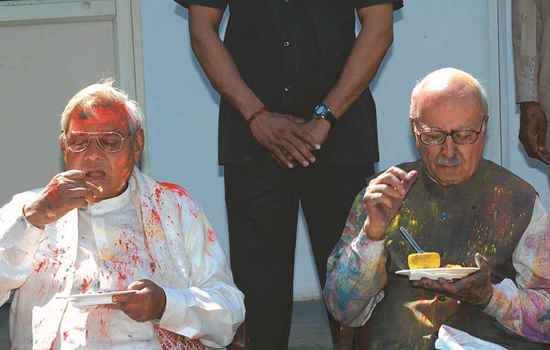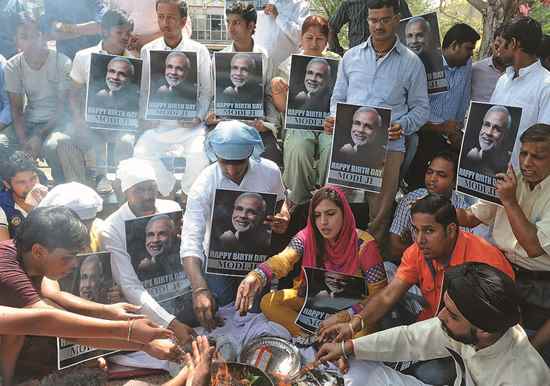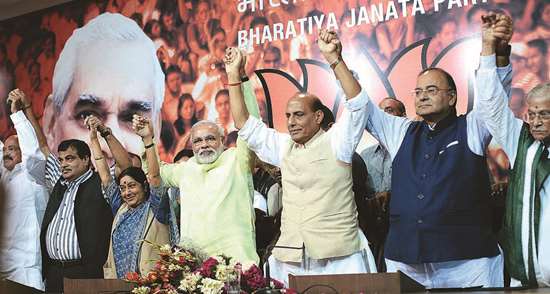BJP 2.0
What the Narendra Modi era means
- Emergence of a cult figure whose image subsumes everyone else's, including the party's
- Wholesale shift in BJP's centre of gravity from New Delhi to Ahmedabad, via Nagpur
- By rooting for Modi, RSS tightens its stranglehold on BJP; brings Hindutva back to the table
- His business record in Gujarat promises a pro-capitalist, pro-corporate investment climate
- Rags-to-riches OBC leader whose rise cocks a snook at clubby nature of national politics
- Disappearance of a collective leadership with the eclipse of second- and third-rung leaders
- Muscular attitude to internal security and external affairs issues, especially vis-a-vis Pakistan
- Re-energised, vocal and abusive cadre who won't tolerate questions on the NaMo mythology
- An unapologetic take-it-or-leave-it attitude towards both minorities and NDA partners
***
For critics of Narendra Damodardas Modi, Friday the 13th could now on always be a reminder of how a domineering regional satrap "willed himself" to pursue an ambition, bulldozing his way to the top and throwing both convention and a well-entrenched party establishment in Delhi off its feet permanently. September 13, 2013, will also be remembered as the day the BJP decisively changed direction, taking itself back to an agenda and conception of polity that it had for a long time been trying to distance itself from.
Late that evening, as a bitterly divided leadership emerged to announce the name of Modi as their candidate for prime minister, it wasn't just "willpower" that had won the day. After all, Modi has pitchforked himself to a position of power and prestige in the party that had so far been held only by A.B. Vajpayee and L.K. Advani. In the ascendance of Modi, in many ways, is the beginning of a new chapter in the journey of the 33-year-old saffron outfit. For the first time since its inception, it is 'without' its two founding fathers: Vajpayee and Advani. While the almost decade-long absence of former prime minister Vajpayee can be attributed to poor health (the BJP's tallest-ever leader turns 89 in December this year), it's the curious case of the forced retirement of patriarch L.K. Advani that defines what has changed for the BJP this September.
|
While that last prediction may be tested in the longer run, for now the BJP is clear that the purpose in raising the pitch for Modi is rather immediate electoral gains. The impending Lok Sabha polls has pushed the BJP to eclipse its entire galaxy of leaders behind the shadow of one man who the party thinks can deliver it the mandate. For long a cadre-based, ideologically oriented party, it's now trying to transform itself into a single leader-driven, result-oriented one which will be guided by the tools of marketing. Indeed, it almost seems as if second- and third-rung leaders have no identity in the BJP of 2013.

Photograph by Narendra Bisht
Extraordinarily, this constitutes a generational shift, with the old order making way for the new, only in a debatable sort of way. The fundamental shift that the BJP GenNext's incessant NaMo chant marks out is away from the old ideal of collective leadership. The 'collective' has now been replaced by the 'cult'. And a cult, by its inherent nature, rarely subscribes to either reason or rationale. Is it any wonder then that Advani's persistent demand that they wait until after the assembly polls later this year to anoint Modi was brushed aside by the 'followers'? For old-timers, it is this rise of the cult around a singular figure of supreme authority that will remain the defining difference between the BJP of yore and the BJP now. A senior party leader says, "The BJP never believed in a single window entry or exit point for its politics. When you start promoting one leader, you create a cult which will bring drastic changes within the party. Everything will change, from the party's style of working to the motivation and reason for being in politics." He adds that "the BJP used to pride itself on following a framework that it based its politics on. Now that will be gone and replacing it will be an all-encompassing personality who no one dares rise against."
|
For, in reality, Vajpayee was part of a duality. It worked, with all its conflicts, only because he had a partner like Advani, willing to step aside after maximising the electoral dividends of ideology as and when the need arose. Had Advani not stepped aside to make way for Vajpayee in 1998, it would have been impossible for the BJP to drum up allies to form the government. Similarly, had the moderate Vajpayee not made space for Advani's rath yatra in 1990, the BJP wouldn't have made the leap from two seats in the Lok Sabha to 88. With that division of power and the ability to switch faces between moderate and hawkish gone, the BJP may have forfeited a structural flexibility it always needed. Modi is no Vajpayee. But the responsibility of success and failure will now just rest on one set of shoulders: his. He will now have to roll into one both the Hindutva mascot and the pro-development image that he has been honing for a few years now.

NaMo, NaMo BJP supporters perform a 'havan' on Modi's birthday at Hanuman mandir in New Delhi, Sept 17. (Photograph by Tribhuvan Tiwari)
"Modi has no choice but to don the mantle of both 'Hindu hriday samrat' and 'vikas purush'," says a senior leader. While the BJP will woo the Hindu heartland in states like Uttar Pradesh with Modi as Hindutva mascot, for the urban elite the party will bank on NaMo's development-oriented politics to wean votes. Beyond that, the party will also see tangible changes in its policies and programmes. Top amongst them, senior party leaders say, will be an intensification of stand vis-a-vis "issues of internal security and economic policies".
|
Modi's carefully crafted image of a decisive leader will also now ensure that the BJP is far more aggressive on matters pertaining to internal security. Those close to the Modi cabal say "internal security is an emotional issue with Indians and Modi understands that well. Modi will not just present a strong leadership ready to take on troublesome neighbours but will also steer clear of Advani's Jinnah-is-secular kind of 'moderate' statements. Modi's internal security, unlike the old BJP's, would mean that the minorities must learn to behave".
So does that mean Modi in Delhi would entail the return of Hindutva hardliners and the iron fist of the RSS controlling the BJP? No doubt the Sangh has been instrumental in ensuring that Modi was propelled to the top job, but Nagpur, sources say, still has reservations about Modi's readiness to accommodate the Sangh in his scheme of things. A senior RSS functionary toldOutlook, "All said and done, even if the Delhi circle despises what the RSS leadership had proposed, they will finally bow to the Sangh's diktats. That said, the RSS may have helped Modi become PM candidate but we keep little hope that Modi will be as generous in his conduct towards us in the future." In a self-contradictory line, the Sangh also argues that hardline Hindutva has run its course and will have little resonance in an India of 2014.
This contradiction runs through BJP strategy as well. For, by making Modi the flag-bearer of the party's identity, his drumbeaters have cut the line on the BJP's adopted success mantra of coalition politics. Unlike the BJP of the '90s that found its strength from cobbling up ally support as the National Democratic Alliance (NDA), BJP-II will struggle hard to find allies. Even as few in the party mourned the demise of the 19-year-old alliance with the JD(U), there's no denying the BJP's go-it-alone strategy may dent the NDA in a permanent sort of way. Needless to say, Modi lacks Vajpayee's qualities of flexibility and reconciliation, both imperative traits in a coalition era.
That both Modi and BJP 2.0 are playing for high stakes is a given. The reincarnation of the BJP has permanently put an end to the perennial first-among-equals debate in the BJP. Modi's time has come but will his moment under the sun coincide with BJP 2.0 shining in reflected glory? The answer to that is just seven months away.
By Prarthna Gahilote in Mumbai
AUTHORS: PRARTHNA GAHILOTE
PEOPLE: NARENDRA MODI | L.K. ADVANI | ATAL BEHARI VAJPAYEE
TAGS: BJP | ELECTIONS | RSS | NDA | HINDUTVA
SECTION: NATIONAL
SUBSECTION: COVER STORIES
PLACES: GUJARAT
 Translate
Translate| ALSO IN THIS STORY |
ANALYSIS The RSS knows well that Modi can bring in only a limited number of seats. But by projecting him it's making a calculated gamble. NEELABH MISHRA |
NARENDRA MODI Of the 154 seats in eight states, BJP-NDA can at best hope to pick up 61 seats. Uttar Pradesh, where Modi's right-hand-man Amit Shah is in charge, is the great imponderable. |
NARENDRA MODI Of the 101 seats in its four states, the BJP-NDA can pick up about 56 seats. In both Maharashtra and Gujarat, the room for improvement is limited. |
NARENDRA MODI Of the 129 seats in these four states, the BJP will get less than 30 seats. What it will lose in Karnataka due to its diminution, it's unlikely to make up in Andhra Pradesh. |
NARENDRA MODI Of the 153 seats in 13 states, BJP can at best hope to pick up some 40 seats. On its own, it might gain somewhat in Bihar but Modi's entry has already cost it an NDA partner in JD(U). |
 OPINION Now, the RSS is the BJP and the BJP is the RSS. JYOTIRMAYA SHARMA |
 OPINION A pre-poll PM candidate hurts the polity, promotes personality cult RAJEEV DHAVAN |
FOREIGN AFFAIRS How would the world deal with 'Prime Minister Modi'? And vice versa? PRANAY SHARMA |


No comments:
Post a Comment